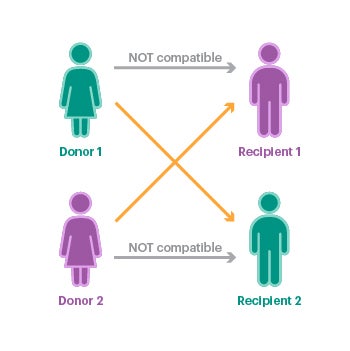
Living kidney donation allows a healthy person to donate one kidney. It offers benefits like a shorter wait and better match for the recipient.
Living kidney donation is when a healthy person donates one of their two kidneys while they are alive. Getting a kidney from a living donor has lots of benefits for the person who needs a transplant, called the recipient. If you are interested in donating a kidney, you will work with a transplant center at a hospital. The transplant center will make sure you are healthy enough to donate, do the surgery, and help you recover.
There are a few common requirements for people who are interested in living donation. You must be at least 18 years old. Some transplant centers require a donor to be 21 or even a little older. There are some medical conditions that could prevent you from being a living donor, including having uncontrolled high blood pressure, diabetes, or cancer. If you’re a smoker, you will most likely be asked to quit before being approved to donate. You should be honest with the team about your smoking habits to make sure that the donation and transplant are successful.
Each transplant center has slightly different requirements, so you should always let the transplant center decide who would be a good donor. If you are approved as a living donor at one transplant center, you may be able to get evaluated at other centers who have different requirements.

Learn everything you need to know about donating a kidney
in this free, self-paced
online program.
If you are planning to donate to someone you directly, there is always a chance you will not be a good match. Maybe you and the recipient do not have blood types that work together, or there can be other factors that would not allow the transplant to be successful.
If you turn out not to be a good match, another option is a “paired exchange”. A paired exchange involves two pairs of living donors and their recipients. The two recipients “swap” donors so that each receives a kidney from the other person’s donor. If this is an option for you, your transplant team will coordinate the entire process, including finding the other matching pair.

While there are no physical benefits for a living donor to donate a kidney, kidney transplant can save the life of someone with kidney failure. People with kidney failure who receive a transplant can live longer and enjoy life more, especially giving them freedom from staying on dialysis.
Getting a living donor transplant has several benefits for the recipient with kidney failure compared to getting a deceased donor transplant:
Just like having any other surgery, there are risks involved with having a living donor surgery. Some short-term risks include:
The transplant team will talk to you more about these and other potential long-term risks of donating a kidney during your evaluation.
The transplant center will have a dedicated team just for your care during the evaluation and surgery. Their goal is to take care of your health and give you the support you need to make the best decision for you – whether that means you end up donating or not.
Donating a kidney is a very personal decision. You may want to talk to people you trust about your choice, including family or friends, no matter if you’re trying to donate to someone you have a relationship with or to someone you do not know. You should never feel any pressure to donate. It can be helpful to talk to living donors who’ve gone through the process for support or your faith leader to help you decide if living donation is right for you.
If you’re interested in becoming a living donor, the first thing you'll have to do is contact a transplant center to get evaluated. If you have someone in mind who you’d like to donate to, you usually have to get evaluated at the same transplant center. If you don’t have someone in mind to donate to, then you can get evaluated at any transplant center to begin the process.
The costs for the donor directly related to the evaluation, surgery, and follow-up appointments are covered through your recipient’s health insurance, no matter who you donate to. There are some expenses not covered by health insurance, including pay for missing work, childcare, and travel expenses.
There are programs that can help you pay for these costs. Some people decide to have fundraisers to raise money for out-of-pocket expenses not covered by insurance. Talk to the transplant center to learn more about any programs they offer to support living donors.
After you’ve contacted a transplant center, you'll have a 1–2-day evaluation that includes meeting your living donor team and having tests done, including blood draws, urine samples, and imaging, like x-rays and CT scans.
Once you’re approved, you'll be scheduled for surgery at a good time for both you and your recipient. Your surgery will most likely be laparoscopic, meaning you'll have tiny incisions in your belly area to remove your kidney. Most donors only stay in the hospital after donating for about 1-2 nights.
It will take about 4-6 weeks to fully recover and get back to a normal, healthy life. You'll have follow-up appointments with the transplant team to make sure you're doing well and healing properly.
Life after donating a kidney is very similar to life before donating a kidney!